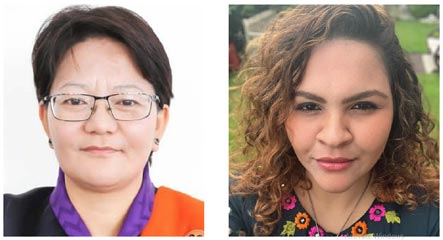Queen Jetsun Pema Wangchuck of Bhutan has founded The PEMA, an apex agency to coordinate mental health and protection services in Bhutan. It is named after the lotus, which blooms into beauty even from the depths of the most challenging conditions. “During the Covid-19 lockdown, domestic violence spiralled.
Our Queen put a hotline in place and immediately requisitioned hotel rooms for those who needed it,” recounted Peldon Tshering, Board Member at The PEMA Secretariat. “While Her Majesty works tirelessly for her people, her highest priority continues to be the safety and welfare of the most vulnerable, particularly women and children.” Under His Majesty King Jigme Khesar Namgyel Wangchuck’s leadership, while Dasho Dechen Wangmo was Bhutan’s Health Minister, we managed to curtail COVID-19 fatalities to 21 deaths, of whom 20 were already terminally ill patients.

Now, by Royal Command, Dasho Dechen has been tasked by Her Majesty to work with a team of dedicated counsellors and other professionals in the field to address the mental health crisis as the Head of the PEMA Secretariat. The office was inaugurated in 2022 by the Queen, and for Dasho Dechen, this was a lifetime honour and opportunity to serve the country and Her Majesty. Bhutan welcomes causemates, collaborations and resources, and wishes to replicate our model’s successes internationally because mental well-being is the heartbeat of Gross National Happiness.
Bhutan, with unwavering support from the member states, successfully proposed the Paro Declaration at the Ministerial Roundtable of the 75th WHO Southeast Asia Regional Committee Session in September 2022. Calling for the integration of mental health care into primary health care and community engagement, the Declaration seeks to address challenges faced by 1 in 7 people in the region. On September 19, 2023, Queen Mathilde of Belgium joined Queen Jetsun Pema in calling for renewed action and investment in mental health at the High-Level Meeting ‘Mental Health for All’, co-hosted by Bhutan, Belgium, UNICEF, WHO and United for Global Mental Health.
Governments have a responsibility to help rebuild personhood and livelihoods, just as they rebuild physical infrastructure after conflicts and disasters, notes Shahbaz Taseer, who was abducted by militants after his father Governor Salmaan Taseer’s assassination. According to the WHO Mental Health Atlas 2020, while the global average of mental health workers is 13 per 100,000, there are only 2.4 personnel per 100,000 people in South Asia.
This, despite a quarter of the population struggling with depression and anxiety. Pakistan has the largest service gap with 0.55/100,000, followed by Myanmar with 0.
87, India with 0.89, Bangladesh with 1.1, Nepal with 1.
18, Bhutan with 2.49, Afghanistan with 2.85, Sri Lanka with 5.
46, and the Maldives with 6.22. Nowhere has there been a sharper decline than in Pakistan, which had 19.
15 workers per 100,000 in 2014. Capacity building is required. Good mental health helps societies actualise potential and manage change and uncertainty resiliently.
There is growing consensus for South and Southeast Asia to collaboratively build mental health systems and wellbeing-centric development plans which account for social, economic and environmental factors, and not just traditional determinants like physical health and genetic predispositions. These determinants include socioeconomic status, access to education and employment, family dynamics, cultural norms, discrimination and exposure to adverse childhood experiences. Addressing mental health concerns requires a concise understanding of these determinants and a comprehensive approach that extends beyond the current clinical interventions.
For instance, the Director General of Friendship NGO Runa Khan found that the root cause of miscarriages leading to social ostracisation of women in Bangladesh was drinking salty water during pregnancy. Recognizing the urgent need for enhancing mental health services, on November 3, 2021, Her Majesty laid the foundation for the construction of the PEMA Centre, the first 60-bed Mental Health Hospital in Thimphu, alongside integrating mental health services in primary healthcare centres and communities. In 2021, Queen Jetsun instituted The PEMA Board to strategise the mitigation of existing service gaps, conduct consultations, expedite preventive interventions and ensure that there was no duplication of efforts.
As Health Minister, Dasho Dechen chaired the Board, composed of members from Their Majesties’ Office, the Royal Physician, the Head of the Psychiatry Department, and a Royal Bhutan Police Representative. Findings highlighted fragmentation, dispersed interventions, isolated mandates, limited collaboration and incomprehensive services which did not link prevention, response and treatment, nor address after-care and social reintegration. “Capacity building aligned with the WHO Mental Health Gap Action Programme would ensure that non-specialist frontline workers in community-facing sectors like agriculture can perform a basic triage and refer patients to services.
This is especially important in the wake of natural disasters and conflicts, where community engagement builds trust,” observes Runa Khan. The PEMA Secretariat, a central agency to spearhead and streamline mental health responses, was inaugurated on June 22, 2022. Taking a life cycle approach and following a continuum of care model, it coordinates, consolidates and ensures comprehensive mental health services.
The PEMA as a nodal agency provides a model for emulation in similarly resource-challenged contexts. It has four core mandates. First, it is building a proactive and integrated mental health service delivery network to address issues early on and provide referrals.
Second, it is creating an enabling system by reviewing legislation, collecting data and mobilising resources. Third, it is building multi-sectoral partnerships. Lastly, it anchors advocacy to reduce stigmas and discrimination and supports workplaces.
There are three main divisions, dedicated to prevention and engagement, triage and response, and restoration and rehabilitation. “For a long time after my escape, I felt like I roamed the earth alone, to find meaning, energy and someone who cared,” admits Shahbaz Taseer, who was abducted by Uzbek and Pakistani militants after his father Governor Salmaan Taseer’s assassination. “Being held captive and tortured seemed easier than having to function in society and resume a 9 to 5 work day in a corporate environment, where my peers had surpassed me, a 33-year-old with no savings and nothing to call his own in the world.
Bhutan’s focus on the restitutive aspect of reintegration by ensuring patients are gainfully employed revolutionises mental healthcare. Governments have a responsibility to help rebuild personhood and livelihoods, just as they rebuild physical infrastructure after conflicts and disasters.” The Queen personally oversees operations from her office at the PEMA Secretariat and sees it as her responsibility to care for the carers.
Indian psychiatrist Dr Anjali Chhabria recommends that mental healthcare providers be given insurance against litigation and protection from occupational hazards. Spatially, it is Her Majesty’s hope that The PEMA’s vast, green grounds, and many atriums and access points, provide the privacy, community and communion with nature that patients and their families require to heal and decompress. The Centre encourages meditation, and yoga and provides access to prayer wheels.
“Spirituality is one’s armour during adversity,” recounts Shahbaz Taseer. “Bhutan, with its political will, small population, and geographical challenges acts like a pilot for hybrid mental healthcare provision in the region. Together we can build a system incorporating telemedicine, drone deliveries of medication, and in-person treatment to maximise coverage,” recommends Runa Khan.
Dr. Chhabria proposes an evolving approach, which embraces innovation. Sharing resources and expertise, and investing in prevention, enhanced services, reintegration programmes, research and innovation will equip South Asia to meet the needs of the future.
With a comprehensive and forward-thinking approach, The PEMA envisions building a mental health system that is responsive, effective, and sustainable. Dasho Dr. Dechen Wangmo is the Head of the PEMA Centre and the former Health Minister of Bhutan.
Latoya Ferns is the CEO of the PoliTweak media syndicate. This article has been syndicated from PoliTweak, which promotes sustainable development and democratic peace in South Asia..



















